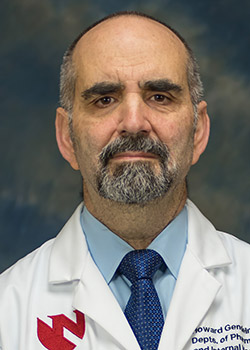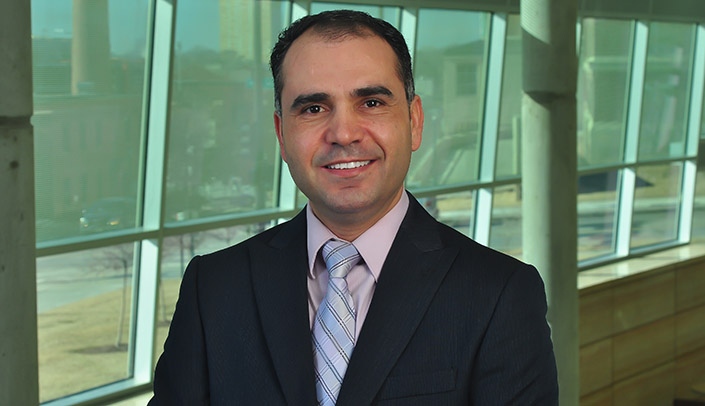In a new study published today in Nature Communications, a UNMC team of researchers reported on the development of a once-yearly pharmaceutical treatment designed to prevent human immunodeficiency virus type one (HIV-1) transmission. The study demonstrates, for the first time, the mechanism underpinning the long-acting drug properties based on its formulation safety, rigor and manufacture reproducibility.
 |  |
Benson Edagwa, PhD | Howard Gendelman, MD |
The team developed a prodrug — or a biologically inactive compound, which is hydrolyzed “broken down” in the body to produce the native active drug — that demonstrates promising, long-lasting pharmacokinetic profiles in human cells and in animals. The prodrug allows cabotegravir (CAB) — a potent HIV-1 drug that blocks the virus from inserting its genetic material into human cells — to form a depot at the muscle site of injection. The drug also is stored at tissue sites, including lymphoid tissues, for one year and beyond.
The study results showed an extended apparent half-life for the CAB prodrug, made possible by its slow release from a water-soluble nanocrystal. The prodrug was identified by its slow dissolution from the nanoparticle followed by chemical conversion to a native agent. The enzymatic hydrolysis used, in part, the body’s own enzymes activating at the injection site and tissue stores. These are the same stores that harbor persistent viral infections.
UNMC’s technology transfer office, UNeMed, licensed the technology described in this publication to Exavir Therapeutics for commercial development.
The study, drawing on results from three independent laboratories, found plasma CAB levels stayed high for at least one year after a single dose in animal models. The study also showed sustained native drug concentrations at the muscle injection site and in lymphoid tissues.
The Covance Contract Research Organization conducted the rigor and reproducibility study in collaboration with UNMC’s College of Pharmacy (Yazen Alnouti, PhD) and UNMC’s College of Medicine (Benson Edagwa, PhD, and Howard Gendelman, MD) laboratories and their staff scientists.
“By giving the drug in the form of a crystal, the drug half-life is no longer dependent on the speed the drug is broken down then excreted from the human body,” Dr. Alnouti said. “It is, in contrast, dependent on the release rate from the crystals in the storage sites before being converted into an active form and absorbed into the systemic circulation. The conversion is a multistep process but still allows the drug to prevent infection for extended times after a single dose.”
“The implications of a year-long antiviral are huge in terms of preventing transmission,” Dr. Edagwa said. “Less frequent dosing is one benefit, but there also will be fewer adverse side effects as a result of frequent life-time dosing. In terms of global health, a once-a-year injectable that prevents disease transmission has huge implications not simply for HIV/AIDS, but other chronic diseases, as well.”
The study follows earlier work by the research team published in 2020.
While CAB has received attention from scientists and patients for both treatment and prevention of HIV/AIDS, Dr. Gendelman said in the paper, “limitations in dosing volumes, intervals of administration, and local injection site reactions remain. To overcome these, prodrug nanoformulations were developed and are currently undergoing pre-clinical evaluations by our group.”
“This study shows that we are on the path to success,” Dr. Alnouti said. “A once-a-year CAB treatment will have a tremendous impact on medication compliance and greatly ease the lives of people with HIV and AIDS while effectively providing protection against disease transmission.”

Wow! Really helpful science. Congratulations on this success.
Outstanding work – congratulations to you all!!
Congratulations professor Alnouti for this important success
Congratulations to all team on this success especially PhD yazen alnouti
Outstanding works, this type of teams deserve a respect of everyone by praying for them to reach their goals.
Congrats 🎉🎈🎊 my lovely brother
Congrats for PhD.Yazen Alnouti and for the team 👏❤️🎉
ألف مبارك دكتور يزن وفريق .. ما شاء الله عليك .. بالتوفيق الدائم
Congratulations !!
Congratulations 🎊
السلام عليكم ورحمة الله
الف مبروك يا دكاترة وإن شاء الله تعالى بالتوفيق فيما هو قادم
Congratulations 🎊
مبارك لك يا دكتور يزن
بارك الله فيك
Congratulations 👏
ما شاء الله ربي يزيدك من العلم وترفع راسنا واحنا فخورين فيك دكتور يزن ابن بلدي الاردن 🤍🤍
Congrats 👏👏👏 we are proud of you and your amazing team.
ما شاء الله اشي يرفع الراس مبارك دكتور يزن